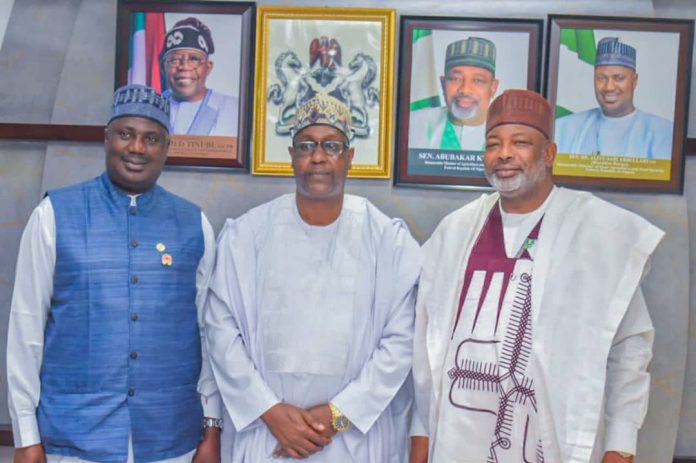The Federal government says it has so far spent over N200 billion on intervention to farmers across Nigeria to ensure food security in the country.
Minister of Agriculture and Food Security, Sen. Abubakar Kyari disclosedthis when he received in his officea delegation from The Gambia who were in Nigeriato seek collaboration with Nigeria to improve food production.
He noted that the Ministry has also distributed over N2,150,000 worth of fertilisers free of charge to support farmers across the country.
The delegation from The Gambia was led the country’s Minister of Agriculture, Livestock and Food Security (FMALFS), Dr. Dembal Sabally.
Kyari commended the Gambia for the bold step to seek partnership with Nigeria, noting that it has been a tough journey for the present government to arrive at the point it is now in its quest to achieve food sufficiency. He said the country has uped the game in terms of production through collaboration with development partners like Food and Agricultural Organization (FAO), World Bank amongst others.
The Minister pointed out that when President Bola Ahmed Tinubu, came into power in 2023, he was committed to making sure that Nigeria is food secured, “that propelled him to give a marching order that Nigeria must achieve food security and food sovereignty,” he said.
Sen. Kyari further revealed that the President declared a state emergency on Food Security and changed the Ministry’s name from the Federal Ministry of Agriculture and Rural Development to the Federal Ministry of Agriculture and Food Security which was a deliberate attempt to tackle food insecurity arising from climate change, Covid-19, devastating effect of flooding amongst others.
Sen Kyari added that the Ministry also felt the need to take up Mechanisation to make agriculture a business and ease off because of the dreadgry involved in agriculture.
He said, “We have a huge capacity among our youths, but because of the dreadgry involved, it scares them away.
“Rice is one of those areas you have mentioned but I believe that we have also achieved a lot of milestones in research, crops, like Wheat for instance is something that we are working on and has consistently shown an improvement and success from when we started in 2023”, the Minister emphasized.
He also pointed out that “in 2023 farmers were assisted with imported wheat seeds and as at last year, no seed was imported, because we have developed our own seeds internally and were able to cultivate almost 500 metric tons of wheat within Nigeria to boost productivity through our various research institutes and Agencies under the Ministry”.
The Minister highlighted the challenges of rice in Nigeria to include affordability and availability, which is one challenge Mr. President has given them to tackle.
He, therefore, stressed on the benefits of the out grower scheme, noting that the scheme has turned Agriculture around and ” for us the scheme covers the challenges because we believe that the small-scale farmers should also have access to long term financing. The out grower scheme is a short term between planting and harvesting (which is within 4-5months), so there is no long-term investment””, the Minister revealed.
In his remarks, the Gambian Minister of Agriculture, Livestock and Food Security, Dr. Dembal Sabally expressed satisfaction and appreciation over the reception and thanked President Bola Ahmed Tinubu for his support.
He stated that Nigeria has overcome rice insufficiency, of which Gambia is still struggling to achieve self-sufficiency in rice production, pointing out that they import over 80% of their rice, which is affecting their economy.
Sabally revealed that his team, that had been on ground to understudy Nigeria’s rice cultivation processes, visited Kebbi State, one of the rice mills saw the irrigation processes, and intend to go and replicate the same in Gambia.
He further stated that the few things that stood out to them, was the out grower scheme success in Nigeria which is one thing, his team has picked up, from post harvest management, mechanisation, seeds, packaging, and the trade of rice.


